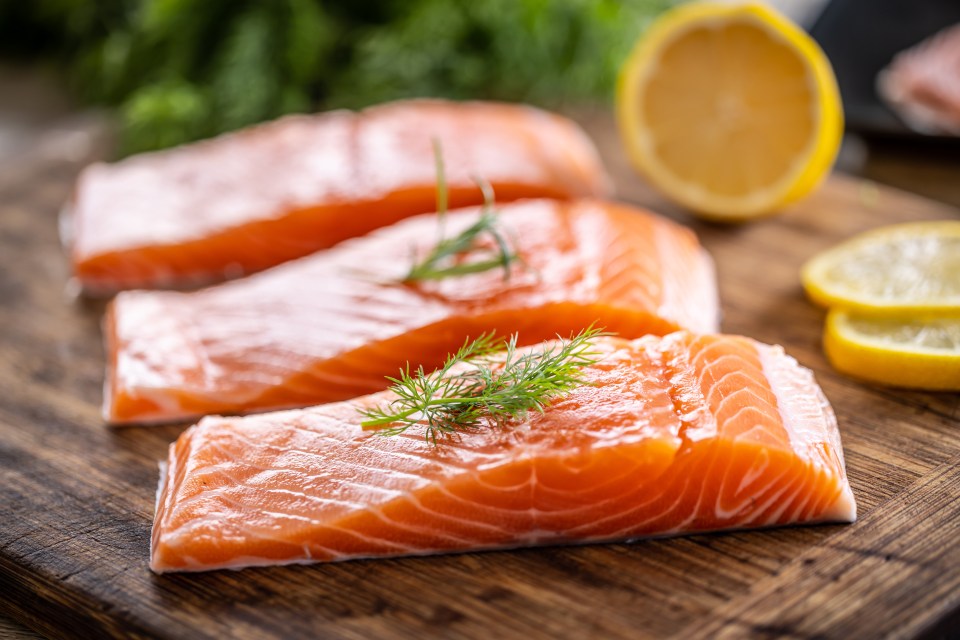EATING foods with key nutrients could lower your risk of 14 types of cancer, scientists say.
A diet rich in so-called “healthy fats” have previously been linked to improved brain and heart health.

2
Now, scientists from the University of Georgia reckon omega-3 and omega-6 fatty acids may also help protect you against various types of cancer.
They found that people with higher levels of these fats in their blood stream had a lower risk of developing a number of types of cancer, including bowel, stomach, and lung cancer.
Yuchen Zhang, lead author of the study and a doctoral student in UGA’s College of Public Health, said: “Higher omega-3 and omega-6 levels were associated with lower rates of cancer.
“These findings suggest that the average person should focus on getting more of these fatty acids in their diets.”
Read more on cancer
Omega-3 and omega-6 fatty acids are healthy fats that are both essential for human health.
Your body can’t make them so you have to get them through food.
They’re present in a number of different foods, such as:
- Fatty fish – such as salmon, trout, mackerel and sardines
- Nuts – such as walnuts
- Seeds – such as sunflower, hemp, flaxseeds and chia seeds
- Plant oils – such as sunflower, canola, flaxseed and soybean oil
Many people turn to fish oil supplements to up their consumption of the healthy fats, with past studies showing that the pills may to help lower cholesterol and reduce the risk of heart disease.
The research – published to the International Journal of Cancer – drew on data from over 250,000 people participating in the UK Biobank study, which tracked their health for more than a decade.
Of the 253,138 participants, 29,838 of them were diagnosed with cancer during the follow-up period.
Researchers studied the nutrients’ effect on the risk of developing 19 different cancers:
- Head and neck
- Oesophagus
- Stomach
- Bowel
- Rectal
- Hepatobiliary (liver, gallbladder and bile ducts)
- Pancreatic
- Lung
- Melanoma
- Connective tissue
- Breast
- Uterine
- Ovarian
- Prostate
- Kidney
- Bladder
- Brain
- Thyroid
- Lymphoid tissue
Participants with higher levels of omega-3s in their blood had lower rates of bowel, stomach and lung cancers, in addition to lower rates of other digestive tract cancers.

2
Meanwhile, high omega-6 levels seemed to lead to lower rates of 14 different cancers – head and neck, oesophagus, stomach, bowel, rectal, hepatobiliary tract, pancreas, lung, malignant melanoma, connective soft tissue, kidney, bladder, brain, and thyroid cancer.
But high consumption of omega-3s seemed to increase the risk of prostate cancer by 3 per cent.
And high levels of the fatty acids seemed to have no effect on the risk of developing the four remaining cancers – including ovarian, breast and uterine cancer.
Despite not protecting against three cancers that mainly affect women, omega-6 fatty acids seemed to have a stronger protective effect in younger people, especially women.
How your diet could lower your risk of cancer
There’s no one diet that can guarantee that you won’t get cancer – but eating a healthy, balanced diet can reduce the risk.
This involves eating mostly fruit and vegetables, plenty of wholegrains – like brown pasta and wholegrain bread – and opting for healthier sources of protein like fresh chicken, fish or pulses, including lentils and beans.
Your overall diet has a bigger impact on cancer risk than any individual food or ingredients.
Cutting down on certain foods and drinks that have been linked to higher risk of cancer is also a good place to start.
To lower your risk of cancer, it’s advised you eat less:
- Processed meat such as sausages, bacon and deli meats – these have been linked to bowel cancer
- Alcohol – booze has been linked to higher risk of seven types of cancer
- High-calorie foods and sugary drinks such as fast food and fizzy pop – they can make it harder to maintain a healthy weight and obesity has also been linked to a higher risk of cancer
Eating and drinking these doesn’t mean you’ll definitely get cancer, but they have been linked to an increased risk.
Source: Cancer Research UK
According to the researchers, these findings suggest that the benefits of omega-3 and omega-6 fatty acids may not be one-size-fits-all.
Kaixiong Ye, associate professor at the University of Georgia, said: “For women, it’s an easy decision: Eat more omega-3.”
But for men, upping intake of omega-3 fatty acids should be approached with more careful consideration, he said.
Researchers said that more research is needed to fully understand the relationship between the fatty acids and cancer risk.
Read More on The US Sun
“Our study laid a solid foundation for future mechanistic studies into the roles of polyunsaturated fatty acids (PUFAS) in the aetiology of various cancers,” the study authors concluded.
“It also provided insights into the development of cancer prevention strategies by managing circulating PUFAs.”
